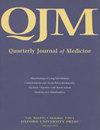Helicobacter pylori eradication in patients with peptic ulcer disease: clinical consequences and financial implications.
引用次数: 32
Abstract
We assessed clinical consequences and financial implications of Helicobacter pylori eradication in 175 patients with peptic ulceration, of whom 106 had been free from H. pylori infection for a mean of 3.2 years, while 69 remained infected. We used quarterly questionnaires to examine consumption of ulcer-healing medication and antacids. In the 106 successfully treated patients, gastrointestinal haemorrhage as a complication of peptic ulcer complications during the 344 patient years after eradication (0.003 per patient year) was 18-fold lower than during the 912 patient years before eradication (0.056 per patient year). Of the H. pylori-negative patients, 12-18% used ulcer-healing medication during any one of the three-month periods of the survey, compared with 34-51% of the patients with residual H. pylori infection. The average cost of the ulcer-healing drugs consumed by the H. pylori-negative patients was 30.59 pounds during the 12 months of the survey, compared with 99.05 pounds for H. pylori-positive patients. Consumption of antacids was also lower in the H. pylori-negative group. Successful eradication of H. pylori significantly reduced the annual cost of ulcer-healing drugs consumed by the patients with ulcer disease. Maintenance of ulcer remission following successful eradication of H. pylori also significantly reduced ulcer complications.消化性溃疡患者的幽门螺杆菌根除:临床后果和经济意义。
我们评估了175例消化性溃疡患者根除幽门螺杆菌的临床后果和经济意义,其中106例平均3.2年没有幽门螺杆菌感染,而69例仍然感染。我们使用季度调查问卷来检查溃疡愈合药物和抗酸药的使用情况。在106例成功治疗的患者中,胃肠道出血作为消化性溃疡并发症的并发症,在根除后的344患者年(0.003 /患者年)比根除前的912患者年(0.056 /患者年)低18倍。在幽门螺杆菌阴性的患者中,12-18%的患者在调查的三个月期间使用了溃疡愈合药物,而残留幽门螺杆菌感染患者的这一比例为34-51%。在调查的12个月里,幽门螺杆菌阴性患者的溃疡愈合药物的平均费用为30.59英镑,而幽门螺杆菌阳性患者的平均费用为99.05英镑。在幽门螺杆菌阴性组中,抗酸剂的消耗量也较低。成功根除幽门螺旋杆菌显著降低了溃疡患者每年消耗的溃疡愈合药物的成本。在成功根除幽门螺杆菌后维持溃疡缓解也显著减少溃疡并发症。
本文章由计算机程序翻译,如有差异,请以英文原文为准。
求助全文
约1分钟内获得全文
求助全文

 求助内容:
求助内容: 应助结果提醒方式:
应助结果提醒方式:


